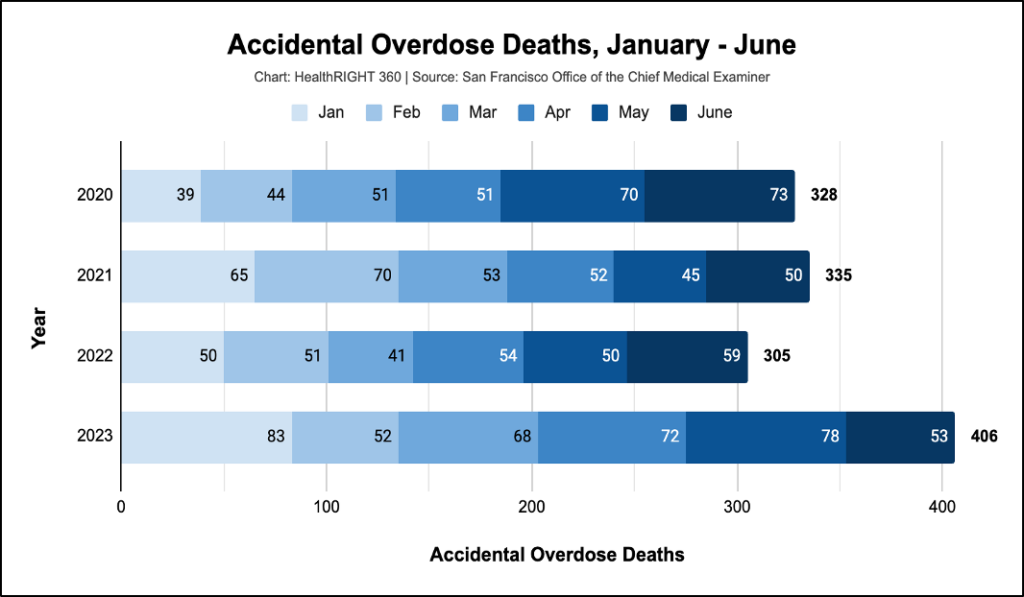San Francisco, CA — The Office of the Chief Medical Examiner (OCME) has released their Report on Accidental Overdose Deaths for the first six months of 2023. The preliminary number of accidental overdose deaths in June is 53, which brings the total for the year up to 406. This is 101 accidental overdose deaths more than the 305 that occurred during the first half of 2022.[1]
The latest OCME report also includes previously unavailable data. Prior reports only provided the location of residence for people who had a discernible fixed address, which was broken down into five geographic categories: Tenderloin, SOMA, Inner Mission, Polk/Russian Hill, and Other. There are now six geographic categories for fixed location of residence; the Other category has been divided into two categories – people who resided in an SF Location and people who resided in a non-SF Location.
This additional granularity reveals that the vast majority of people who were housed and died of an accidental overdose were San Francisco residents. Among the people who have died in 2023, 280 were determined to have had a fixed address, and 265 of them were San Francisco residents, or 95 percent.
Figure 1. Accidental Overdose Deaths, January – June

A record 406 people have died of accidental overdose in San Francisco during the first half of 2023.
While the City has not yet implemented wellness hubs or replacement overdose prevention services similar to those that were offered at the Tenderloin Center, HealthRIGHT 360’s SoMa RISE, which recently celebrated its first year of operation, is proving to be a successful model. The implementation of SoMa RISE, which is a low-barrier drug sobering center, was the top priority of the San Francisco Methamphetamine Task Force and a central recommendation of the city’s Mental Health SF legislation.[2][3] At SoMa RISE, participants can access bathrooms, showers, food, and a place to rest. SoMa RISE is a gateway to other vital services that help participants improve their living situation and well-being, including but not limited to medical care, mental health, substance use, and housing services.
To address the ongoing overdose crisis, HealthRIGHT 360 recommends doing the following to ensure an effective, comprehensive continuum of care for people who use drugs that is grounded in public health: expand non-discriminatory access to medication for substance use disorder treatment and culturally affirming, voluntary treatment; provide fact-based drug education; fund peer-led programs and tenant-led overdose navigation in supportive housing; scale up drug sobering centers and drug adulterant testing; support and resource syringe services programs; and implement harm reduction interventions such as overdose prevention centers and safer supply.
About HealthRIGHT 360:
HealthRIGHT 360 is a non-profit provider of substance use disorder treatment, mental health services, and primary care to over 47,000 Californians annually, including more than 15,000 San Franciscans. HealthRIGHT 360 provides care that is compassionate, non-judgmental, and evidence-based. We provide services, regardless of one’s ability to pay; inspired by our belief that healthcare is a right, not a privilege. Learn more about HealthRIGHT 360 and our programs at https://www.healthright360.org/.
[1] Rodda, L. “Accidental Overdose Report, Jan 2023 – June 2023,” OCME Accidental Overdose Reports, Office of the Chief Medical Examiner, July 14, 2023. https://sf.gov/resource/2020/ocme-accidental-overdose-reports
[2] “Final Report, 2019,” San Francisco Methamphetamine Task Force, San Francisco Department of Public Health, October 2019. https://www.sfdph.org/dph/comupg/knowlcol/MethTaskForce/default.asp
[3] “Mental Health SF Legislation Approved Unanimously by Board of Supervisors,” Office of the Mayor, December 10, 2019. https://sfmayor.org/article/mental-health-sf-legislation-approved-unanimously-board-supervisors
